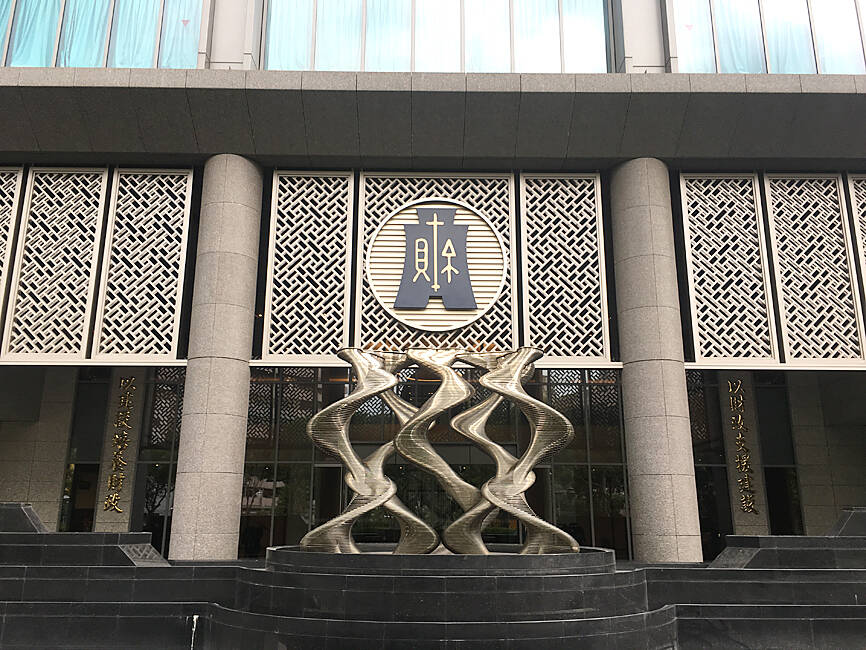Tax revenue last month totaled NT$214.7 billion (US$7.05 billion), rising 5.9 percent from the same period a year earlier on the back of record-high tariffs and inheritance taxes as demand for imported vehicles rose, the Ministry of Finance said yesterday.
The data were in line with a boom in vehicles sales, a chill in property transactions and signs of a recovery on the local bourse, ministry statistics official Liang Kuan-shuan (梁冠璇) told an online media briefing.
Tariffs and inheritance taxes, unusual revenue growth drivers, spiked 30.6 percent and 97.2 percent year-on-year to NT$14.9 billion and NT$5.2 billion respectively, Liang said, adding that it was not clear whether the uptrend would continue.

Photo: Clare Cheng, Taipei Times
Tariffs from imported vehicles totaled NT$4.1 billion, Liang said.
Vehicles packed local ports waiting for their owners, a rare sight after port congestion amid COVID-19 lockdowns ended, she said.
Car imports also helped boost the sales tax total by 20.2 percent to NT$14.7 billion, she said.
The number of new license plates issued last month more than doubled to 44,161, Chinese-language media reported earlier.
The ministry declined to supply details for the surge in inheritance taxes except to say there were three cases that generated more than NT$100 million.
Inheritance tax rates are unpredictable, it added.
By contrast, land value increment taxation totaled NT$6.9 billion, down 36 percent from a year earlier, as taxable cases decreased 22.9 percent to 49,552, consistent with a cooling property market, Liang said.
Taxes from securities transactions, a gauge of stock investment interest, shrank 19.5 percent to NT$17.6 billion, reversing a rebound in February, ministry data showed.
The February rebound in securities transactions had a lot to do with the effect of national holidays, so the data were not overly significant, Liang said.
While daily turnover continued its negative cyclical movements, the pace of retreat has tapered off, she said, adding that things might improve as evidenced by TAIEX rallies in the past few weeks.
In the first quarter, tax revenue totaled NT$487.2 billion, a 0.9 percent increase from the same period last year, the ministry said.
The total was 15.9 percent of this year’s budget, 13.5 percent ahead of the schedule, it said.

Taiwan will prioritize the development of silicon photonics by taking advantage of its strength in the semiconductor industry to build another shield to protect the local economy, National Development Council (NDC) Minister Paul Liu (劉鏡清) said yesterday. Speaking at a meeting of the legislature’s Economics Committee, Liu said Taiwan already has the artificial intelligence (AI) industry as a shield, after the semiconductor industry, to safeguard the country, and is looking at new unique fields to build more economic shields. While Taiwan will further strengthen its existing shields, over the longer term, the country is determined to focus on such potential segments as

UNCERTAINTY: Innolux activated a stringent supply chain management mechanism, as it did during the COVID-19 pandemic, to ensure optimal inventory levels for customers Flat-panel display makers AUO Corp (友達) and Innolux Corp (群創) yesterday said that about 12 to 20 percent of their display business is at risk of potential US tariffs and that they would relocate production or shipment destinations to mitigate the levies’ effects. US tariffs would have a direct impact of US$200 million on AUO’s revenue, company chairman Paul Peng (彭雙浪) told reporters on the sidelines of the Touch Taiwan trade show in Taipei yesterday. That would make up about 12 percent of the company’s overall revenue. To cope with the tariff uncertainty, AUO plans to allocate its production to manufacturing facilities in

COLLABORATION: Given Taiwan’s key position in global supply chains, the US firm is discussing strategies with local partners and clients to deal with global uncertainties Advanced Micro Devices Inc (AMD) yesterday said it is meeting with local ecosystem partners, including Taiwan Semiconductor Manufacturing Co (TSMC, 台積電), to discuss strategies, including long-term manufacturing, to navigate uncertainties such as US tariffs, as Taiwan occupies an important position in global supply chains. AMD chief executive officer Lisa Su (蘇姿丰) told reporters that Taiwan is an important part of the chip designer’s ecosystem and she is discussing with partners and customers in Taiwan to forge strong collaborations on different areas during this critical period. AMD has just become the first artificial-intelligence (AI) server chip customer of TSMC to utilize its advanced

Chizuko Kimura has become the first female sushi chef in the world to win a Michelin star, fulfilling a promise she made to her dying husband to continue his legacy. The 54-year-old Japanese chef regained the Michelin star her late husband, Shunei Kimura, won three years ago for their Sushi Shunei restaurant in Paris. For Shunei Kimura, the star was a dream come true. However, the joy was short-lived. He died from cancer just three months later in June 2022. He was 65. The following year, the restaurant in the heart of Montmartre lost its star rating. Chizuko Kimura insisted that the new star is still down